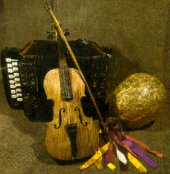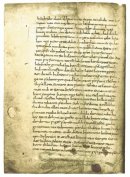Oh, the weary cutters and oh, the weary sea,
Oh, the weary cutters have stolen my laddie from me.
They've pressed him far away foreign
With Nelson beyond the salt sea.
Oh, the lousy cutters and oh, the weary sea,
Oh, the lousy cutters have taken my laddie from me.
They always come in the night,
They never come in the day,
They come at night and steal the laddies away.
Oh, the weary cutters and oh, the weary sea,
Oh, the weary cutters have taken my laddie from me.
I'll give the cutter a guinea,
I'll give the cutter no more,
I'll give him a guinea to steal my laddie ashore.
Oh, the weary cutters have stolen my laddie from me.
They've pressed him far away foreign
With Nelson beyond the salt sea.
Oh, the lousy cutters and oh, the weary sea,
Oh, the lousy cutters have taken my laddie from me.
They always come in the night,
They never come in the day,
They come at night and steal the laddies away.
Oh, the weary cutters and oh, the weary sea,
Oh, the weary cutters have taken my laddie from me.
I'll give the cutter a guinea,
I'll give the cutter no more,
I'll give him a guinea to steal my laddie ashore.
envoyé par Bernart Bartleby - 25/11/2016 - 13:25
×
![]()










Testo che compare in diversi pubblicazioni ottocentesche, come “Northumbrian Minstrelsy. A Collection of the Ballads, Melodies and Small-Pipe Tunes of Northumbria”, a cura di J. Collingwood Bruce e John Stokoe, pubblicata dalla Society of Antiquaries of Newcastle-upon-Tyne nel 1882.
Testo trovato su 52 Folk Songs interpretate da Phil Edwards.
Nel suo album “52 Folk Songs: Red”
Ma certamente il brano è da datarsi anteriormente, per via dell’esplicito riferimento all’ammiraglio britannico Horatio Nelson (1758-1805), uno che per mare cominciò ad andarci che non aveva ancora dieci anni e che a cavallo tra 700 e 800 combattè tante battaglie navali contro i francesi, fino all’ultima di Trafalgar del 1805, dove trovò la morte per mano di un cecchino.
E’ proprio durante la seconda metà del 700 che il sistema dell’“impressment”, dell’arruolamento forzato, cui ricorsero in particolare le flotte militari e sopra tutte la Royal Navy, ebbe la sua massima applicazione.
Il brano è stato interpretato da diversi artisti britannici, tra cui Pat Elliott nel disco collettivo “Canny Newcassel. Ballads and Songs from Newcastle and Thereabouts” (1972) e gli Steeleye Span in “Commoners Crown” (1975)